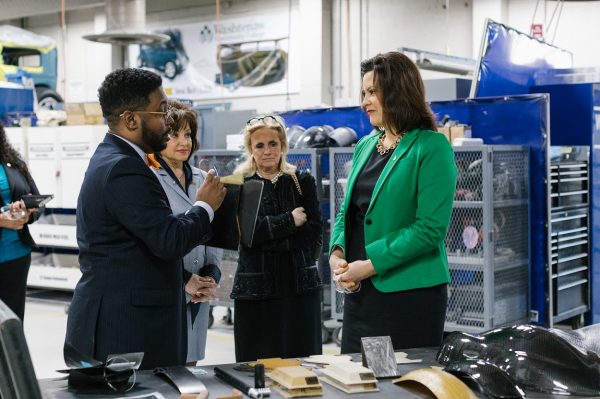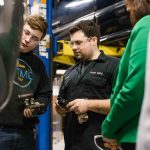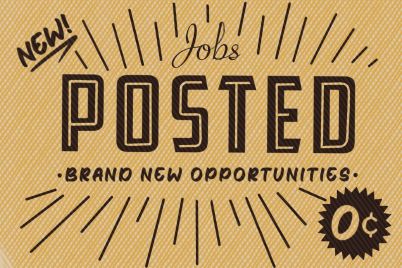
Brandon Tucker (left), dean of advanced technology and public service careers, discusses WCC advanced transportation materials with Gov. Gretchen Whitmer as WCC President Rose Bellanca and U.S. Rep Debbie Dingell look on. Sara Faraj | Washtenaw Voice
By Catherine Engstrom-Hadley
Staff Writer
Last Tuesday, Gov. Gretchen Whitmer visited WCC for the Workforce Pipeline Summit and a tour of the Advanced Transportation Center.
The tour was led by WCC President Rose Bellanca and Brandon Tucker, dean of advanced technology and public service careers. Bellanca and Tucker spoke to Whitmer about WCC programs, how the Advanced Transportation Center operates and the different projects students are working on.
Due to buzz of a “brain drain”—the emigration of highly trained or intelligent people from a county or a state—happening to talent in Michigan, it’s important to create a solid foundation for workforce development, while also accounting for quality infrastructure, access to drinking water and expanded education opportunities, Whitmer said in an interview with The Washtenaw Voice.
“Part of why my budget is focused on the fundamentals is because if we don’t get those right, all the rest of those efforts are going to be shaky,” Whitmer said.
She also brought up statewide broadband. Whitmer’s 2020 budget proposes solutions to help the state get back to the basics and retain the talent it builds, including a $507 million boost to public education.
- Gov. Gretchen Whitmer toured the Advanced Transportation Center on campus before speaking at the Workforce Pipeline Summit in the Morris Lawrence Building. Sara Faraj | Washtenaw Voice
- Gov. Whitmer inspects some of the objects created by the 3D printers on campus. Sara Faraj | Washtenaw Voice
- Graham Petersen (left), WTMC student, 16, and Matthew Bohl, lab assistant, show Gov. Whitmer the process of car brake installation. Sara Faraj | Washtenaw Voice
“Right now in Michigan 44 percent of our population has a postsecondary degree or certificate. That’s not nearly enough, we have jobs that are going unfilled,” said Whitmer. “In my budget, we really prioritize that this is a path that is affordable for anyone who wants to pursue it, to make a good living in Michigan and have job that leads to prosperity.”
In Whitmer’s recent State of the State, she set the goal to provide 60 percent of Michigan population with postsecondary education by 2030. She also rolled out proposals for two new scholarship opportunities: an economic-growth/workforce development program that would provide tuition free pathway to an in-demand industry certificate or associate degree for 25 and older;and the Michigan opportunity scholarship, a two-path approach for graduating high school students.
Path one offers two years of free tuition at a community college and path two provides two years of tuition assistance at a public or not-for-profit four-year university for students demonstrating financial need.
“Michigan’s a great state, no one can compete with us for fresh water, no one can compete with us for quality of life and affordability in a lot of ways, we just have to get the fundamentals right,” Whitmer said. “For younger generations, this is a nonnegotiable.”
During the tour, Tucker shared with Whitmer some of the work of the Advanced Transportation Center, including a story about an 8-year-old Ann Arbor girl whose prosthetic hand was created using 3D printers in WCC’s Industrial Technology Laboratories.
“For the first time she was able to eat a sandwich and fries, it was a life changing event for her,” said Tucker. “All she has to do is move her wrist, and her hand closes.”




